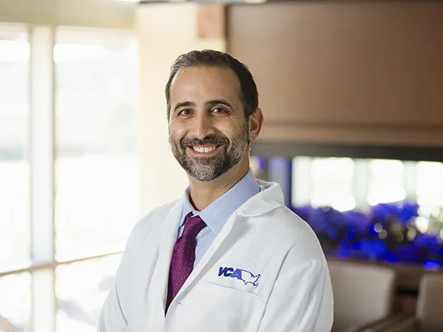Q&A with Fetch Faculty: Zachary Wright, DVM, DACVIM (Oncology)
Learn more about cancer screening tests, including some of the latest ones, and more in this interview with Zachary Wright, DVM, DACVIM (Oncology).
During an interview with Zachary Wright, DVM, DACVIM (Oncology), at the 2025 Fetch National Harbor conference, he shared more information with dvm360 about some promising new cancer screening tests, including their pros and cons, as well as what attendees took away from his lecture during the conference.

Zachary Wright, DVM, DACVIM (Oncology): My name is Dr Zach Wright. I'm a veterinary medical oncologist and the medical director at VCA Dallas [Animal Specialty Hospital] in Texas. I also chair the Mars Veterinary Health Oncology Advisory Board.
dvm360: What are some of the most promising new cancer screening tests, and how do they differ from traditional methods?
Wright: I think all the cancer screening tests are promising. The most promising—I'm not sure I'm willing to go on record for that yet because I think we're still working through it. Traditional cancer screening is on top of a physical exam, in routine blood work, routine imaging, thoracic radiographs, abdominal ultrasound—maybe that's a partial or full body CT scan. That's really how we have been screening to date. All these newer, essentially, liquid biopsies are intended to use fluid—whether that's blood, urine, or effusions—to try and find a malignant diagnosis through those mechanisms.
RELATED: A new tool treating canine osteosarcoma
So they all have pros and cons. They all have different price points. They have different shipping and time delays. Again, I'm not willing to say which one is best. I think all of them have potential, and I think many of them will have different use cases as we start to sort through this. Some of them will be used more for true cancer screening [in] healthy dogs, and some of them—maybe from an oncology perspective—will be more utilized for disease response evaluation and for us to trend those patients a little more.... But I think they're all exciting, and they're all, in my opinion, generally going to be an easier part of our clinical workflow compared to the older methods.
dvm360: What are the most significant takeaways from your lecture on emerging oncology breakthroughs, and why?
Wright: I think the most important part about emerging breakthroughs is that there are breakthroughs. There's a lot about cancer in general—but specifically [in] veterinary medicine—that we don't have the answers to. For me, it's really encouraging that I can design this lecture, frankly, every year, and it's new content. There are a lot of start-ups and a lot of larger companies that are focusing on veterinary cancer, both diagnostics and therapeutics. So to me, the biggest take-home is that the industry is paying attention and recognizes the need to push things forward, not a specific breakthrough in and of itself.
There's a lot of cancer for us to both diagnose and to treat, and all the tools that are available to us probably are underserving us compared to the human oncology experience. We've got a long way to catch up, so every year, we're ticking off a few of the boxes that help us get to the higher level of care that we need to be providing our patients.